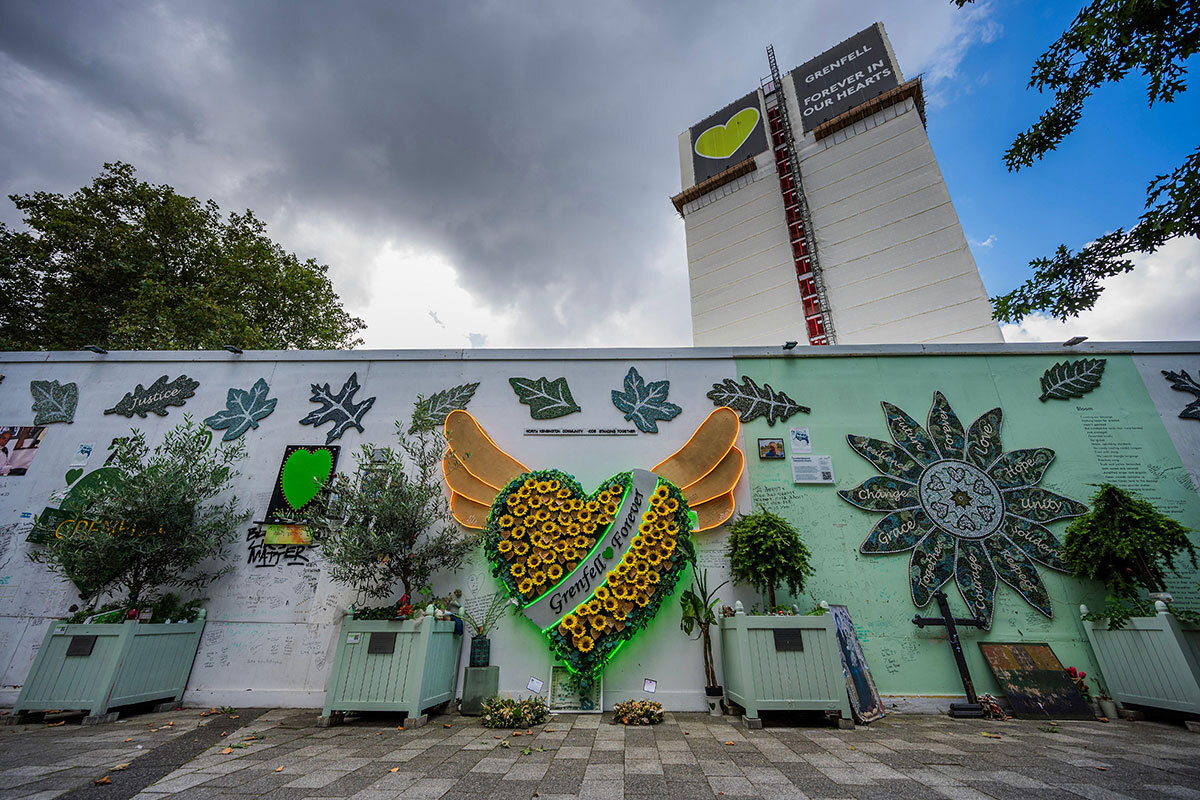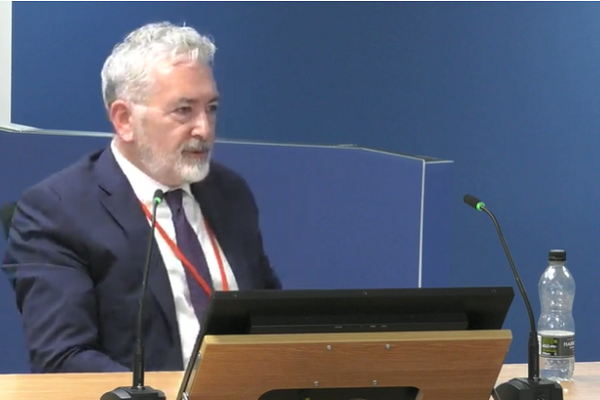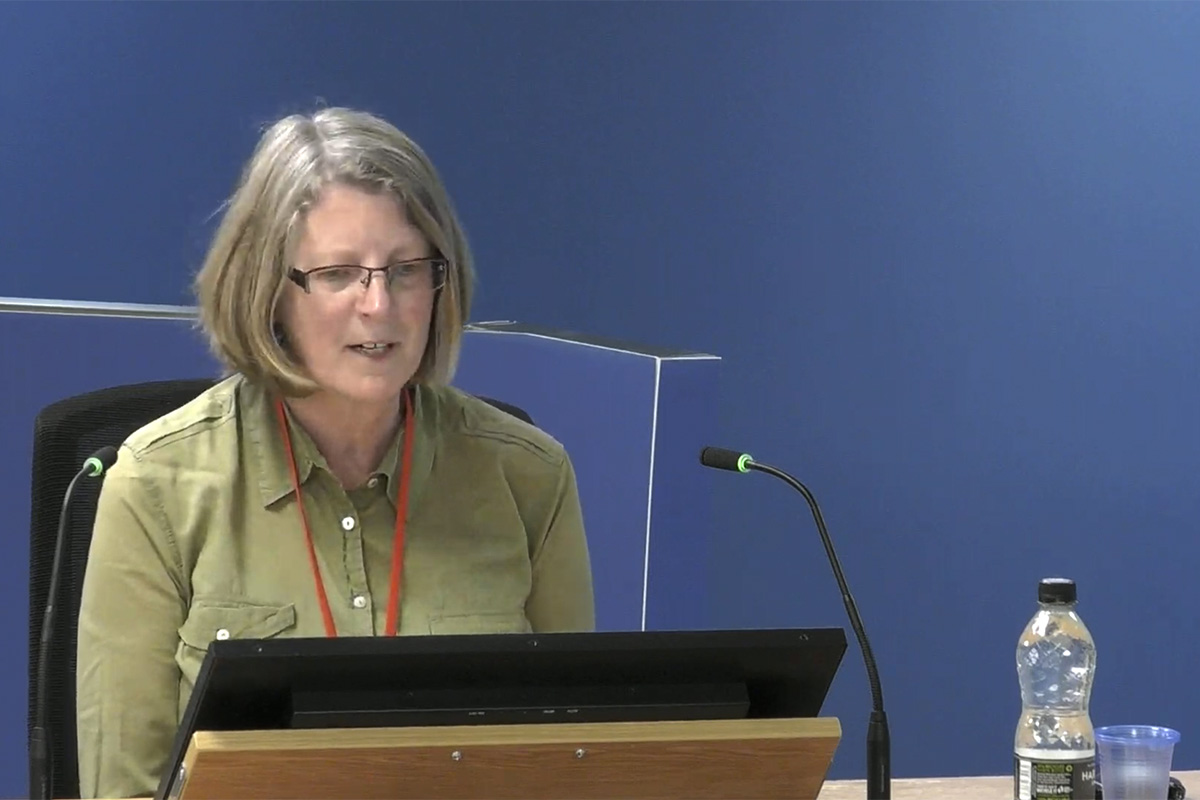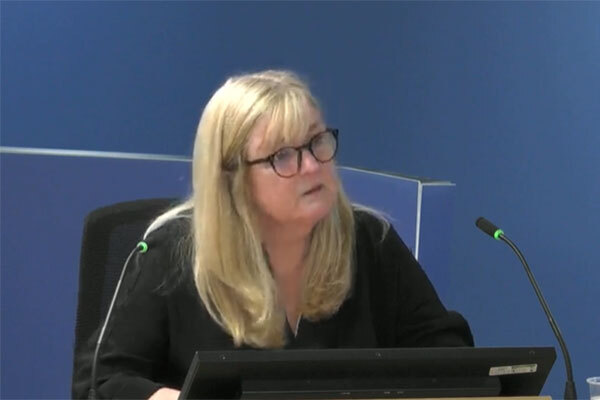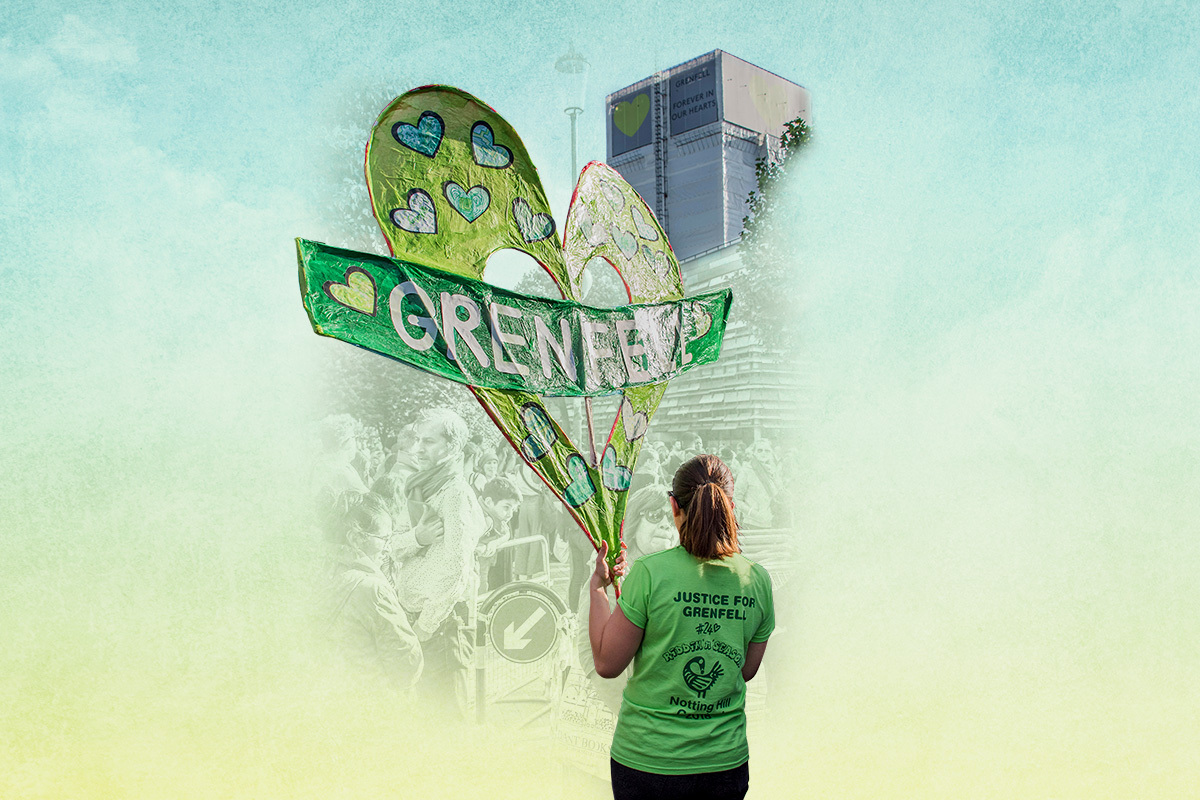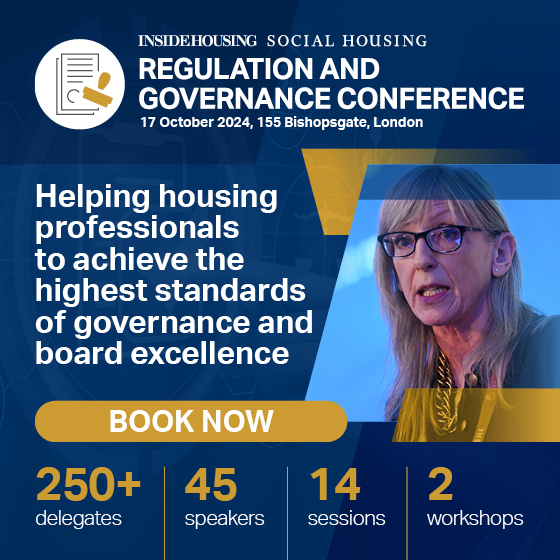KCTMO responsible for ‘chronic and systemic’ safety failings before Grenfell fire, inquiry concludes
Grenfell’s social housing provider was responsible for “chronic and systemic failings” in fire safety management, as well as a “toxic” relationship with the tower’s residents, who came to regard it as an “uncaring and bullying overlord that belittled and marginalised them”.
This is the damning conclusion of the Grenfell Tower Inquiry’s second and final report, published this morning, which said the Kensington and Chelsea Tenant Management Organisation (KCTMO) “lost sight of the fact that the residents were people who depended on it for a safe and decent home”.
The tenant management organisation (TMO) “allowed” this relationship with its customers to deteriorate, which the report said was “a serious failure on its part to observe its basic responsibilities”.
However, the landmark report, which concludes four-and-a-half years of investigation, stopped short of making recommendations covering other social housing providers, saying reforms in the recent Social Housing (Regulation) Act were sufficient to deliver change.
In a press conference to launch the report on 4 September, inquiry chair Sir Martin Moore-Bick said the “simple” truth is that all 72 of the residents’ deaths were “avoidable”.
He said KCTMO was was “badly run” and manipulated the process to appoint an architect for the refurbishment of Grenfell Tower so it could select its chosen firm, Studio E.
His fellow inquiry panel member Ali Akbor said: “Residents deserve to be treated with understanding and respect. The TMO failed to do that.”
KCTMO was appointed by the Royal Borough of Kensington and Chelsea (RBKC) to manage the whole of the council’s housing stock, including Grenfell Tower, in 1996. Its duties included repairs, maintenance and fire safety.
The report concluded there were “chronic and systemic failings” in KCTMO’s management of fire safety. Critically, a fire safety strategy for the tower had still not been approved by the time of the fire.
Relations between KCTMO and its residents had been “troubled” for many years before the fire, according to the report, and by 2017 they had “deteriorated to the point at which they could be described as hostile”.
Two independent reports commissioned by RBKC in 2009 had drawn attention to “numerous serious flaws” around “governance, customer service, staff attitudes and a poor repairs service” at the organisation.
These 2009 reports found that residents’ lack of trust in the TMO “lay at the heart of the problems” and made recommendations for change. However, eight years later, the organisation had “shown little sign of any change and appeared to have learnt nothing about how to treat, or relate to, its residents”.
According to the inquiry, relations between KCTMO and many of the residents were “increasingly characterised by distrust, dislike, personal antagonism and anger” from 2011 to 2017.
“Some, perhaps many, occupants of the tower” regarded KCTMO as an “uncaring and bullying overlord that belittled and marginalised them”, “regarded them as a nuisance, or worse”, and failed to take their concerns seriously, it said.
For its part, KCTMO “regarded some of the residents as militant troublemakers led on by a handful of vocal activists”, principally Edward Daffarn, whose “style they found offensive”.
“The result was a toxic atmosphere fuelled by mistrust on both sides,” the report added.
Mr Daffarn had set up a Grenfell Action Group in 2010 and a blog in 2012 to communicate directly with the TMO and raise concerns about fire safety. The inquiry described him as an “intelligent, articulate and motivated individual”.
Although the council funded the refurbishment of the tower with combustible cladding, which was completed in 2016, the tenant management organisation was responsible for organising and managing it and signed the contract with principal contractor Rydon.
The report found that KCTMO did make efforts to consult residents of the tower about its refurbishment from 2012 onwards. However, in December 2013, it decided it would no longer hold public consultations with residents about the tower.
The decision to discontinue public meetings was “regrettable”, the report said. While a “more conciliatory approach” from Mr Daffarn “might have been reciprocated”, the TMO “ought to have reacted less defensively and, instead of retreating, should have made a greater effort to engage with Mr Daffarn”.
“As custodian of the safety and security of its residents, it must take responsibility for the breakdown in trust,” it added.
In December 2015, 60 residents of Grenfell Tower signed a petition to RBKC stating that residents’ views had been “ignored or minimised”, that their day-to-day concerns had been “belittled and brushed aside” and that they had been forced to “endure intolerable living conditions” while the work on the tower was going on.
KCTMO’s board carried out a review of the refurbishment from January to March 2016, but there was no evidence any residents were invited to join the review. The inquiry called this review “superficial” and “flawed”, adding that it “gave the impression that very little, if anything, had gone wrong” and that there was “no substance in any of the complaints” made in the petition.
“Ignoring residents’ views was entirely consistent with the TMO’s approach to engagement with its residents from at least February 2012, and indeed… from far earlier than that,” it said.
Ultimately, the inquiry concluded that the responsibility for maintaining the relationship between the TMO and the Grenfell community fell “not on the members of that community, who had a right to be treated with respect, but on the TMO as a public body”.
It “lost sight of the fact that the residents were people who depended on it for a safe and decent home and the privacy and dignity that a home should provide”, the report said.
That dependence “created an unequal relationship and a corresponding need for the TMO to ensure that, whatever the difficulties, the residents were treated with understanding and respect”.
“We have concluded that the TMO failed to recognise that need and therefore failed to take the steps necessary to ensure that it was met,” it added. “However irritating and inconvenient it may at times have found the complaints and demands of some of the residents of Grenfell Tower, for the TMO to have allowed the relationship to deteriorate to such an extent reflects a serious failure on its part to observe its basic responsibilities.”

Parts 4 and 5 of the report made “a number of criticisms” of the way KCTMO carried out its responsibilities, including in relation to handling complaints, remedying defects identified in fire risk assessments, installing and maintaining fire protection systems and routine inspection and maintenance of fire doors.
The years between 2009 and 2017 were characterised by a “persistent indifference to fire safety”, particularly the safety of vulnerable people. New front doors installed by KCTMO in 2011 and 2012 did not meet fire resistance standards suggested by building regulations because the TMO had failed to specify the correct fire safety standard when ordering them.
KCTMO did not institute an effective inspection and maintenance programme for self-closing devices on entrance doors despite an enforcement notice issued by the London Fire Brigade in 2015.
Also, its failure to collect information about vulnerable residents to enable personal evacuation plans to be prepared “amounted to a basic neglect of its obligations in relation to fire safety”.
There was “entrenched reluctance” on the part of Robert Black, chief executive of KCTMO at the time, to inform the organisation’s board and RBKC about matters of fire safety. Mr Black “consistently failed to tell either the board or RBKC” of the London Fire Brigade’s concerns about the TMO’s compliance with the fire safety order.
Janice Wray was the health and safety lead at KCTMO and played a “fundamental role” in its performance of fire safety obligations at the time of the fire.
“The responsibilities she was given were probably too much for one person to discharge properly without substantial assistance and effective oversight and unfortunately she had neither,” the report said.
KCTMO’s only fire risk assessor for its entire estate, Carl Stokes, was “allowed to drift into that role” and was “ill-qualified” to carry out fire risk assessments on buildings the size and complexity of Grenfell Tower, “let alone to hold the entire TMO portfolio”. KCTMO “continued to rely uncritically on him, a situation which made the danger more acute”.
KCTMO developed “a huge backlog of remedial work that it never managed to clear”, a situation that was aggravated by the “failure of its senior management to treat defects with the seriousness they deserved”.
“The demands of managing fire safety were viewed by the TMO as an inconvenience rather than an essential aspect of its duty to manage its property carefully,” the report said.
The inquiry also heavily criticised architects Studio E, Rydon and cladding subcontractor Harley Facades, which carried out the refurbishment of the tower, and “took a casual approach” to contractual relations.
“They did not properly understand the nature and scope of the obligations they had undertaken, or, if they did, paid scant attention to them,” the report said. “Everyone involved in the choice of materials to be used in the external wall thought that responsibility for their suitability and safety lay with someone else.”
Studio E “demonstrated a cavalier attitude to the regulations affecting fire safety”, it added. Studio E instructed fire engineers Exova to prepare a fire safety strategy for the refurbished building. A draft was prepared but never completed.
Exova “bears considerable responsibility for the fact that Grenfell Tower was in a dangerous condition on completion of the refurbishment”, the report said.
The report concluded that the TMO must “take a share of the blame for the disaster”, as it failed to take sufficient care in its choice of architect and paid insufficient attention to matters affecting fire safety, including the work of the fire engineer.
KCTMO said: “We are acutely conscious of the terrible impact that this tragedy has had on the bereaved, the survivors, their relatives, and the broader Grenfell Tower community. We accept that the TMO contributed to this and we are deeply sorry.
“We continue to offer our deepest condolences and sympathies to all those affected.
“We sincerely hope that the findings of this comprehensive report will lead to safer homes for all those in social housing.”
Elizabeth Campbell, leader of RBKC, said: “On behalf of the council, I apologise unreservedly and with my whole heart to the bereaved, survivors and residents of Grenfell for our failure to listen and to protect them.
“The inquiry has laid bare the chain of events that led to that night. We fully accept its findings, which are a withering critique of a system broken from top to bottom. It shows beyond doubt that this council failed the residents of Grenfell Tower and the 72 people, including 18 children, who died.
“We failed to keep people safe before and during the refurbishment and we failed to treat people with humanity and care in the aftermath.
“We will learn from every single criticism in the report. We will take time to study it further in detail, listen to the reflections from our communities, and publish a full and formal response in the Autumn.”
All Inside Housing’s breaking stories on the Grenfell Inquiry Phase 2 report
KCTMO responsible for ‘chronic and systemic’ safety failings before Grenfell fire, inquiry concludes
Grenfell’s social housing provider was responsible for “chronic and systemic failings” in fire safety management, as well as a “toxic” relationship with the tower’s residents, who came to regard it as an “uncaring and bullying overlord that belittled and marginalised them”
Failed by ‘incompetence, calculated dishonesty, and greed’: reactions to Grenfell Tower Inquiry report
Inside Housing is highlighting responses to the second and final Grenfell Tower Inquiry report
The Grenfell Tower Inquiry report may not have made recommendations to social landlords, but it is still a major call for change
Today’s Grenfell Tower Inquiry report surprisingly stopped short of making recommendations for social housing providers. But it did ask them to read it and reflect. This is homework which should be taken seriously, writes Peter Apps
Grenfell Inquiry report elects not to make specific recommendations for social housing providers
The Grenfell Tower Inquiry has made no fresh recommendations for social landlords in its long-awaited Phase 2 report, saying recent legal changes are sufficient to drive reform
‘Complacent’ government ‘well aware’ of cladding risks before Grenfell fire but ‘failed to act’
A “poorly run”, “complacent” and “defensive” government department “failed to act on what it knew” about dangerous cladding in the years before Grenfell, amid an enthusiasm for deregulation which “dominated” its thinking
‘Systematic dishonesty’ by product manufacturers ‘very significant reason’ for Grenfell’s deadly cladding, inquiry concludes
“Systematic dishonesty” by product manufacturers was a “very significant reason” why Grenfell Tower was clad in such dangerous materials, the inquiry report into the fire has concluded
Social landlords must be ‘held to account’ for safety of homes, prime minister says
Sir Keir Starmer has pledged to make sure social landlords are “held to account” for the safety of the homes they provide, in a statement following the publication of the Grenfell Tower Inquiry’s second and final report
Sign up for our fire safety newsletter
Already have an account? Click here to manage your newsletters
Sign up to the Regulation and Governance Conference 2024
At a time of major regulatory change, the Regulation and Governance Conference is designed to give board members and governance and risk professionals the insight they need to plan and prioritise effectively.
Join more than 250 delegates and 45 speakers to confidently navigate the change ahead and ensure you have the right governance structures and assurance frameworks to keep tenants safe and run a viable business.
